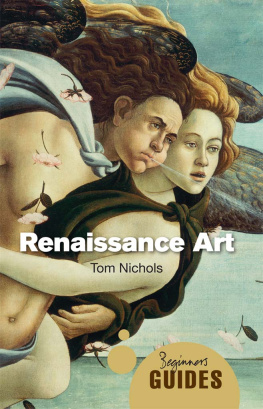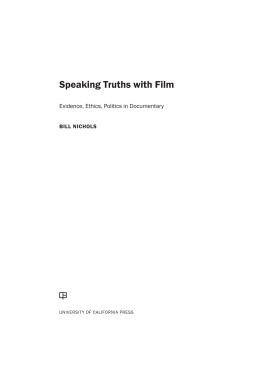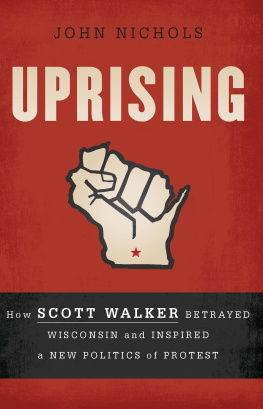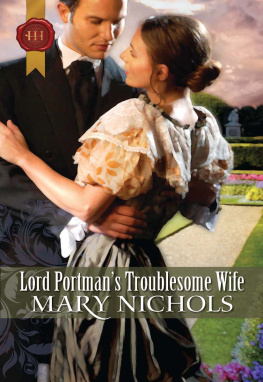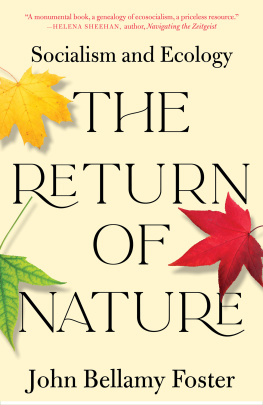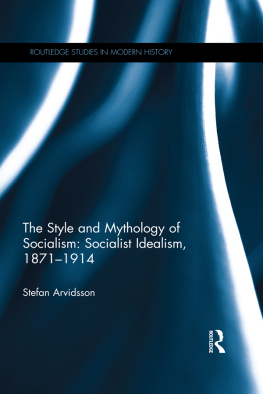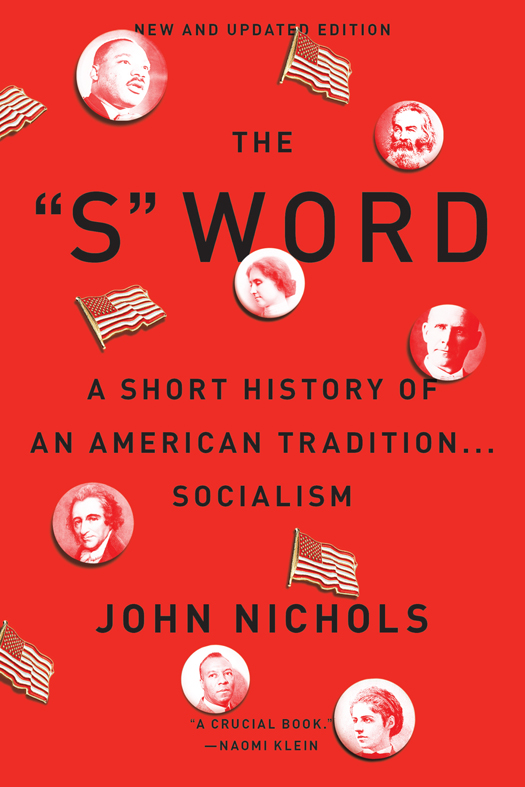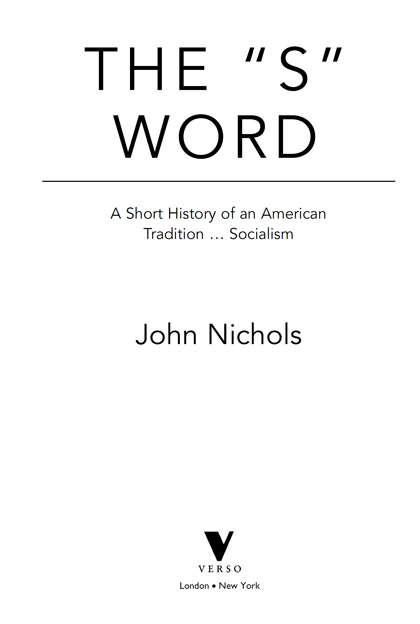This edition first published by Verso 2011
John Nichols 2011
All rights reserved
The moral rights of the author have been asserted
Verso
UK: 6 Meard Street, London W1F 0EG
US: 20 Jay Street, Suite 1010, Brooklyn, NY 11201
www.versobooks.com
Verso is the imprint of New Left Books
ISBN-13: 978-1-84467-679-8
eISBN: 978-1-84467-821-1
British Library Cataloguing in Publication Data
A catalogue record for this book is available from the British Library
Library of Congress Cataloging-in-Publication Data
A catalog record for this book is available from the Library of Congress
v3.1
Contents
PREFACE AND ACKNOWLEDGEMENTS
Whitman, Sylvie and the Emmas
O n a cloudless day in the second summer of Barack Obamas presidencywhen even the children who were so enamored of his election had begun to ask: When is the president going to end the war?my daughter Whitman and I boarded the ferry that would deliver us to a place where it was still possible to believe in the very best of Americas promise. I had been to the island in New York harbor before, but this was Whitmans first visit to the Statue of Liberty. We would, of course, climb as high as permitted, purchase modestly absurd souvenirs and sample the various ice creams proffered by the National Park Service and its assigns. But our primary purpose was a more patriotic one. Whitman is, by virtue of her name and parentage, of a literary bent. And we were inclined this day to read one of Americas finest poetic expressions in the setting where the author intended.
Every child should know America not as the foreboding behemoth a succession of misguided and ill-intended presidents have sought to make it but in the light that Emma Lazarus saw it, as the great and welcoming land that would proudly take upon herself the title: Mother of Exiles.
Keep ancient lands your storied pomp
And, yes: Give me your tired, your poor, your huddled masses yearning to breathe free, the wretched refuse of your teeming shore, Send these, the homeless, tempest-tost to me, I lift my lamp beside the golden door!
With those thrilling linesstill possessing the power to raise goose-bumps that author Caleb Crain heardLazarus transformed what was to have been a monument to those ideals of international republicanism that linked the American and French revolutionsLa Libert Eclairant le Monde (Liberty Enlightening the World) is the actual name of the copper statueinto something altogether more radical and egalitarian. It was not the sculptor Frdric Auguste Bartholdi who made the Statue of Liberty into what Paul Auster properly proclaimed to be a symbol of hope to the outcasts and downtrodden of the world. It was Emma Lazarus who would imagine the beacon-hand that Glows world-wide welcome and who would inspire the rest of us to do the same.
That Lazarus, with her poem written in the service of a fund-raising drive to erect the statues pedestal, gave the great lady of New York harbor her raison detreas James Russell Lowell mused a century agois no longer questioned by any but the most crudely unwelcoming of Americans (an unsettling number of whom, with supreme irony, now refer to themselves as Republicans). Lazaruss poem, The New Colossus, has entered the pantheon of American statementsa part of National Public Radios credo of Americaalong with Tom Paines hope that this experiment might begin the world over again, Abraham Lincolns promise that all men are created equal and the Rev. Martin Luther King, Jr.s call to bend the arc of history toward the realization of that promise with a civil rights revolution sufficient that all Americans might declare themselves to be free at last.
All of the words in the credo are radical. And so it should come as no surprise that Emma Lazarus was a radical. Nor should it come as any surprise that, like Paine, Lincoln and King, Lazarus was an American who entertained and advocated ideas that can reasonably be described as socialist.
This fact, while self evident in her time, and historically evident to this day, is a neglected chapter of the story of Emma Lazarus, of one of our nations most enduring tribunes and, indeed, of the credo of America.
Just as the rough and revolutionary edges of Paine, Lincoln and King have been buffed away by time, public relations and a dumbing down of our history that makes them over as temperate men of limited imagination and capacity to inspire, so the memory of Emma Lazarus has been robbed of meaning by those who would have America be something it was never intended to be: a conservative land ever at odds with a forward march of human progress from the enlightenment to liberation to the cooperative commonwealth. There is an imagining now of Lazarus as a sort of uptown do-gooder, penning kind words with regard to the less fortunate. But that crude characterization would have horrified the poet.
Emma Lazarus was a radical reformer who sought out and embraced socialists, communists and others who proposed transformational responses to the economic and social disparities that diminished not just ancient lands with their storied pomp but the New World of America. She recognized in the tenements of Manhattan and Brooklyn of the 1870s and 1880s a circumstance of inequality that doomed both new immigrants and the descendents of the slaves, indentured servants and religious dissenters who had arrived long before the republican revolt of 1776 to experience a wrenching poverty that, when companioned with racial and ethnic discriminations, made the promise of life, liberty and the pursuit of happiness seem vague at best, and at worst empty.
In her poem Progress and Poverty, written several years before The New Colossus, Lazarus challenged the elites of the Gilded Age to recognize that their wealth was forged through the exploitation of impoverished laborers. Imagining America as a vessel, manned by demigods, with freight of priceless marvels, she asked,
But where yawns the hold
In that deep, reeking hell, what slaves be they
Who feed the ravenous monster, pant and sweat,
Nor know if overhead reign night and day?
Progress and Poverty was penned as a paean to the political economist and social philosopher Henry George, whose book of the same title inspired an international movement to reorder property relations so that the earths resources would no longer be the possession of wealthy and powerful elites. Arguing that the fundamental mistake of capitalism was treating land as private property, George declared: We must make land common property. George became a hero to the urban radicals of the 1880s through his advocacy for taxing the rich and his campaigns for public ownership of communications and transportation systems and for municipal control of water supplies and delivery of basic services. Lazarus and her circle embraced Georges conviction that: The progress of civilization requires that more and more intelligence be devoted to social affairs, and this not the intelligence of the few, but that of the many. We cannot safely leave politics to politicians, or political economy to college professors. The people themselves must think, because the people alone can act. Georges followers became popular educators. In Lazaruss case, her poetry was not merely a vehicle for vibrant wordplay but a tool for transforming the politics of her native New York, America and the world. For Emma Lazarus, Georges utopian vision had the force of a revelation, observed her biographer, Esther Schor. It showed her both her complicity in exploiting the poor and her ethical responsibility to remedy it. Your work is not so much a book as an event, she wrote, the life & thought of no one capable of understanding it can be quite the same after reading it Embracing the indisputable truth of Georges arguments, Lazarus told the author: No one who prizes justice or common honesty can dine or sleep or read or work in peace until the monstrous wrong in which we are all accomplices be done away with


